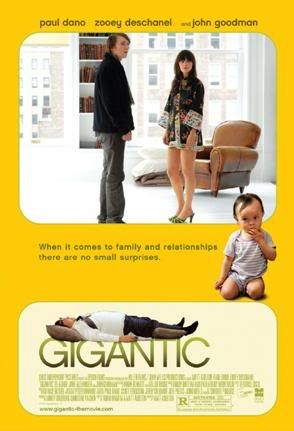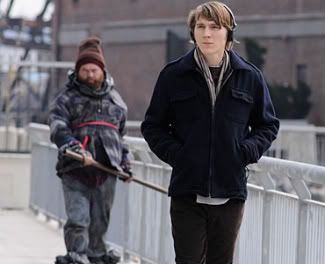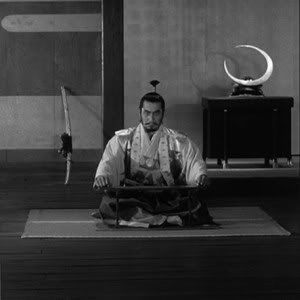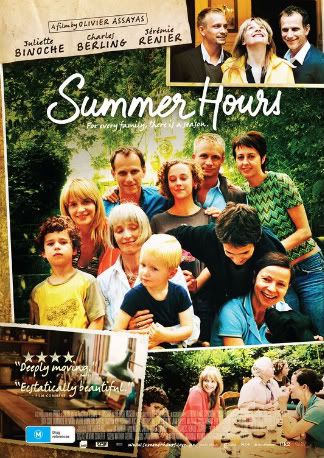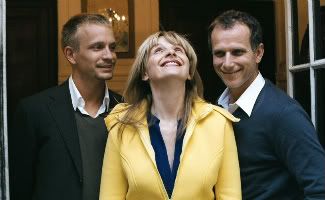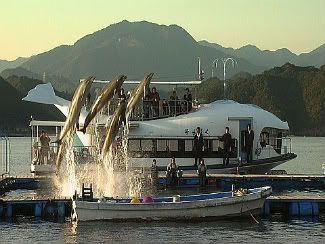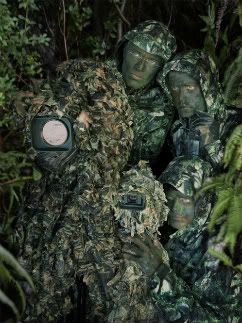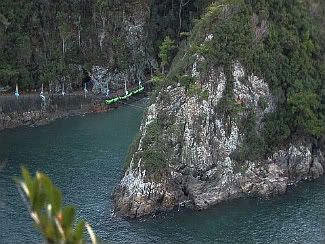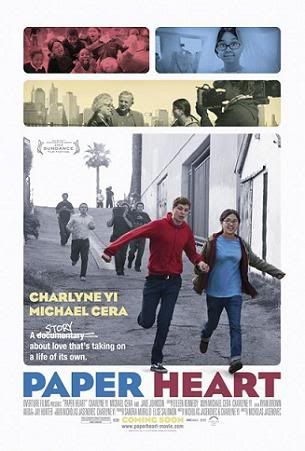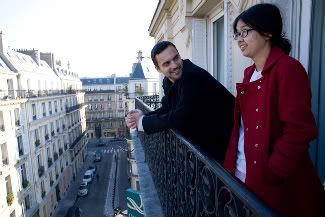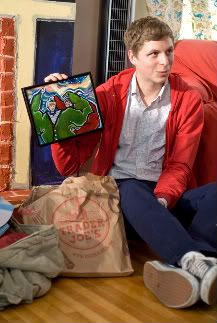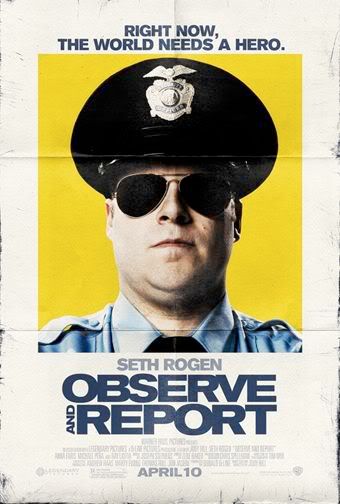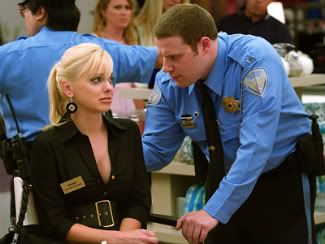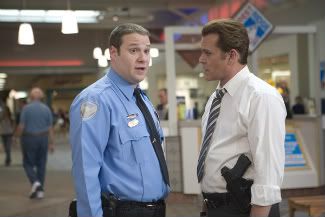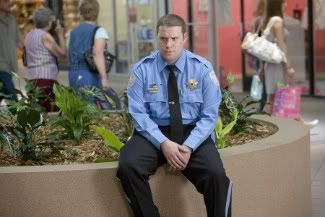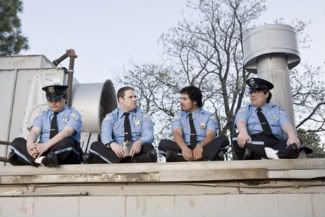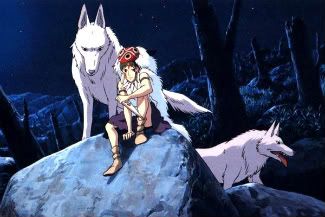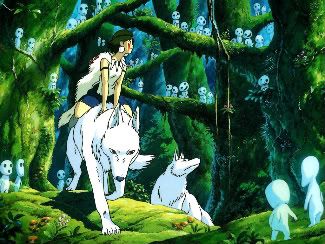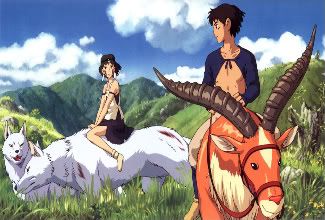Top 97 Films
 1. Dr. Strangelove or How I Learned to Stop Worrying and Love the Bomb (Kubrick, 1964)
1. Dr. Strangelove or How I Learned to Stop Worrying and Love the Bomb (Kubrick, 1964)
 2. There Will Be Blood (Anderson, 2007)
2. There Will Be Blood (Anderson, 2007)
 3. George Washington (Green, 2000)
3. George Washington (Green, 2000)
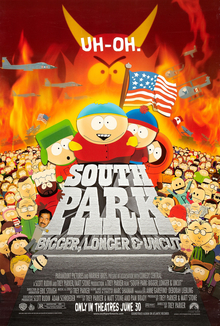 4. South Park: Bigger, Longer, and Uncut (Parker, 1999)
4. South Park: Bigger, Longer, and Uncut (Parker, 1999)
 5. I’m Not There (Haynes, 2007)
5. I’m Not There (Haynes, 2007)
 6. Hercules (Clements and Musker, 1997)
6. Hercules (Clements and Musker, 1997)
 7. A Clockwork Orange (Kubrick, 1971)
7. A Clockwork Orange (Kubrick, 1971)
 8. Vincent (Burton, 1982)
8. Vincent (Burton, 1982)
 9. Elephant (Van Sant, 2003)
9. Elephant (Van Sant, 2003)
 10. Grave of the Fireflies (Takahata, 1988)
10. Grave of the Fireflies (Takahata, 1988)
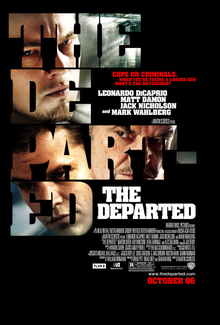 11. The Departed (Scorsese, 2006)
11. The Departed (Scorsese, 2006)
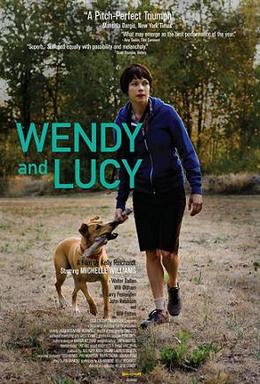 12. Wendy and Lucy (Reichardt, 2008)
12. Wendy and Lucy (Reichardt, 2008)
 13. Big Fish (Burton, 2003)
13. Big Fish (Burton, 2003)
 14. Citizen Kane (Welles, 1941)
14. Citizen Kane (Welles, 1941)
 15. Superbad (Mottola, 2007)
15. Superbad (Mottola, 2007)
 16. Paranoid Park (Van Sant, 2008)
16. Paranoid Park (Van Sant, 2008)
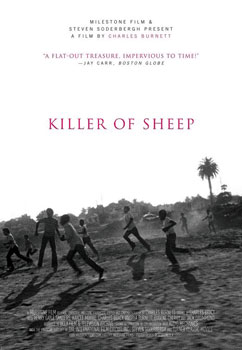 17. Killer of Sheep (Burnett, 1977)
17. Killer of Sheep (Burnett, 1977)
 18. Paprika (Kon, 2007)
18. Paprika (Kon, 2007)
 19. Perfect Blue (Kon, 1998)
19. Perfect Blue (Kon, 1998)
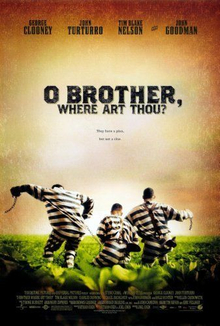 20. O Brother, Where Art Thou? (Coen, 2000)
20. O Brother, Where Art Thou? (Coen, 2000)
21. The Lion King (Allers and Minkoff, 1994)
22. Gerry (Van Sant, 2002)
23. Porco Rosso (Miyazaki, 1992)
24. Bicycle Thieves (De Sica, 1948)
25. My Neighbor Totoro (Miyazaki, 1988)
26. Pan’s Labyrinth (Del Toro, 2006)
27. Rashômon (Kurosawa, 1950)
 28. Grindhouse (Rodriguez, Roth, Tarantino, Wright, Zombie 2007)
28. Grindhouse (Rodriguez, Roth, Tarantino, Wright, Zombie 2007)
29. Bambi (Hand, 1942)
30. Mind Game (Yuasa, 2004)
31. Chop Shop (Bahrani, 2008)
32. Princess Mononoke (Miyazaki, 1997)
33. Unfaithfully Yours (Sturges, 1948)
34. Sweeney Todd: The Demon Barber of Fleet Street (Burton, 2007)
35. Once (Carney, 2006)
36. My Own Private Idaho (Van Sant, 1991)
37. Ratcatcher (Ramsay, 1999)
38. All the Real Girls (Green, 2003)
39. Millennium Actress (Kon, 2001)
40. Man Push Cart (Bahrani, 2005)
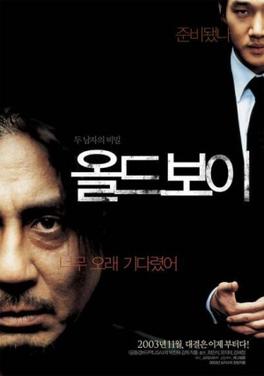 41. Oldboy (Park, 2003)
41. Oldboy (Park, 2003)
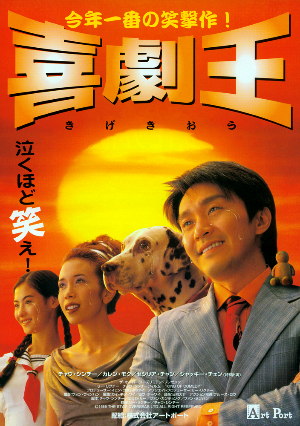 42. King of Comedy (Chow and Lee, 1999)
42. King of Comedy (Chow and Lee, 1999)
43. Adventureland (Mottola, 2009)
44. Hot Fuzz (Wright, 2007)
45. Toy Story (Lasseter, 1995)
46. Infernal Affairs (Lau and Mak, 2002)
47. Ed Wood (Burton, 1994)
48. Team America: World Police (Parker, 2004)
49. Un Chien Andalou (Buñuel, 1929)
50. Annie Hall (Allen, 1977)
51. Fargo (Coen, 1996)
52. sex, lies, and videotape (Soderbergh, 1989)
53. Shadow of a Doubt (Hitchcock, 1943)
54. Tomorrow, the World! (Fenton, 1944)
55. Let the Right One In (Alfredson, 2008)
56. Song of the South (Foster and Jackson, 1946)
57. Punch-Drunk Love (Anderson, 2004)
58. Zack and Miri Make a Porno (Smith, 2008)
59. The Nightmare Before Christmas (Selick, 1993)
60. Funny Games (Haneke, 2008)
61. The Diving Bell and the Butterfly (Schnabel, 2007)
62. Tokyo Godfathers (Kon, 2003)
63. Aqua Teen Hunger Force Colon Move Film for Theaters (Maiellaro and Willis, 2007)
64. Before Sunset (Linklater, 2004)
 65. Dont Look Back (Pennebaker, 1967)
65. Dont Look Back (Pennebaker, 1967)
66. Mars Attacks! (Burton, 1996)
67. Psycho (Hitchcock, 1960)
68. One Flew Over the Cuckoo’s Nest (Forman, 1975)
69. Clerks (Smith, 1994)
70. Batman Returns (Burton, 1992)
71. The Pagemaster (Pixote Hunt and Joe Johnston, 1994)
72. Orgazmo (Parker, 1997)
73. Shotgun Stories (Nichols, 2007)
74. Raising Arizona (Coen, 1987)
75. Il Postino (Radford, 1994)
76. The Squid and the Whale (Baumbach, 2005)
 77. Eastern Promises (Cronenberg, 2007)
77. Eastern Promises (Cronenberg, 2007)
78. The 40-Year-Old Virgin (Apatow, 2005)
79. Charlie and the Chocolate Factory (Burton, 2005)
80. Beetlejuice (Burton, 1988)
81. In Bruges (McDonagh, 2008)
82. Pinocchio (Luske and Sharpsteen, 1940)
83. Ikiru (Kurosawa, 1952)
84. The Cove (Psihoyos, 2009)
85. Waltz With Bashir (Folman, 2008)
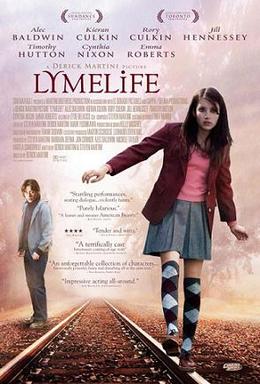 86. Lymelife (Martini, 2009)
86. Lymelife (Martini, 2009)
87. Adaptation (Jonze, 2002)
88. Borat: Cultural Learnings of America for Make Benefit Glorious Nation of Kazakhstan (Charles, 2006)
89. Big Daddy (Dugan, 1999)
90. Children of Men (Cuarón, 2006)
91. High Fidelity (Frears, 2000)
92. The Host (Bong, 2006)
93. Cannibal! The Musical (Parker, 1996)
97. Bolt (Howard and Williams, 2008)
So how's about some statistics?
Most Populated - Burton (8 films)
Top Twenty - Kubrick (2 films) [edges out Van Sant, Burton, and Kon due to rankings]
Recent Films - 3 2009 Films (How did I forget about Moon?)
Non English Language Films - 22 (Not a bad number, I guess)
Completionist - 5 Directors (Each film by these directors I have seen made the cut if they had more than one film on the list. Winners are: Satoshi Kon, Stanley Kubrick, Paul Thomas Anderson, Akira Kurosawa, and Greg Mottola
Best Animated Film (Feature Length) - Grave of the Fireflies
Best Animated Film (Other) - Vincent
Comments are welcome and, for anyone with a literary mind, I encourage checking out my poetry blog filled with all original works for your reading pleasure.
Also I am on the old Twitter thing so I guess you can follow me at twitter.com/FLYmeatwad.
 1. Dr. Strangelove or How I Learned to Stop Worrying and Love the Bomb (Kubrick, 1964)
1. Dr. Strangelove or How I Learned to Stop Worrying and Love the Bomb (Kubrick, 1964) 2. There Will Be Blood (Anderson, 2007)
2. There Will Be Blood (Anderson, 2007) 3. George Washington (Green, 2000)
3. George Washington (Green, 2000) 4. South Park: Bigger, Longer, and Uncut (Parker, 1999)
4. South Park: Bigger, Longer, and Uncut (Parker, 1999) 5. I’m Not There (Haynes, 2007)
5. I’m Not There (Haynes, 2007) 6. Hercules (Clements and Musker, 1997)
6. Hercules (Clements and Musker, 1997) 7. A Clockwork Orange (Kubrick, 1971)
7. A Clockwork Orange (Kubrick, 1971) 8. Vincent (Burton, 1982)
8. Vincent (Burton, 1982) 9. Elephant (Van Sant, 2003)
9. Elephant (Van Sant, 2003) 10. Grave of the Fireflies (Takahata, 1988)
10. Grave of the Fireflies (Takahata, 1988) 11. The Departed (Scorsese, 2006)
11. The Departed (Scorsese, 2006) 12. Wendy and Lucy (Reichardt, 2008)
12. Wendy and Lucy (Reichardt, 2008) 13. Big Fish (Burton, 2003)
13. Big Fish (Burton, 2003) 14. Citizen Kane (Welles, 1941)
14. Citizen Kane (Welles, 1941) 15. Superbad (Mottola, 2007)
15. Superbad (Mottola, 2007) 16. Paranoid Park (Van Sant, 2008)
16. Paranoid Park (Van Sant, 2008) 17. Killer of Sheep (Burnett, 1977)
17. Killer of Sheep (Burnett, 1977) 18. Paprika (Kon, 2007)
18. Paprika (Kon, 2007) 19. Perfect Blue (Kon, 1998)
19. Perfect Blue (Kon, 1998) 20. O Brother, Where Art Thou? (Coen, 2000)
20. O Brother, Where Art Thou? (Coen, 2000)21. The Lion King (Allers and Minkoff, 1994)
22. Gerry (Van Sant, 2002)
23. Porco Rosso (Miyazaki, 1992)
24. Bicycle Thieves (De Sica, 1948)
25. My Neighbor Totoro (Miyazaki, 1988)
26. Pan’s Labyrinth (Del Toro, 2006)
27. Rashômon (Kurosawa, 1950)
 28. Grindhouse (Rodriguez, Roth, Tarantino, Wright, Zombie 2007)
28. Grindhouse (Rodriguez, Roth, Tarantino, Wright, Zombie 2007)29. Bambi (Hand, 1942)
30. Mind Game (Yuasa, 2004)
31. Chop Shop (Bahrani, 2008)
32. Princess Mononoke (Miyazaki, 1997)
33. Unfaithfully Yours (Sturges, 1948)
34. Sweeney Todd: The Demon Barber of Fleet Street (Burton, 2007)
35. Once (Carney, 2006)
36. My Own Private Idaho (Van Sant, 1991)
37. Ratcatcher (Ramsay, 1999)
38. All the Real Girls (Green, 2003)
39. Millennium Actress (Kon, 2001)
40. Man Push Cart (Bahrani, 2005)
 41. Oldboy (Park, 2003)
41. Oldboy (Park, 2003) 42. King of Comedy (Chow and Lee, 1999)
42. King of Comedy (Chow and Lee, 1999)43. Adventureland (Mottola, 2009)
44. Hot Fuzz (Wright, 2007)
45. Toy Story (Lasseter, 1995)
46. Infernal Affairs (Lau and Mak, 2002)
47. Ed Wood (Burton, 1994)
48. Team America: World Police (Parker, 2004)
49. Un Chien Andalou (Buñuel, 1929)
50. Annie Hall (Allen, 1977)
51. Fargo (Coen, 1996)
52. sex, lies, and videotape (Soderbergh, 1989)
53. Shadow of a Doubt (Hitchcock, 1943)
54. Tomorrow, the World! (Fenton, 1944)
55. Let the Right One In (Alfredson, 2008)
56. Song of the South (Foster and Jackson, 1946)
57. Punch-Drunk Love (Anderson, 2004)
58. Zack and Miri Make a Porno (Smith, 2008)
59. The Nightmare Before Christmas (Selick, 1993)
60. Funny Games (Haneke, 2008)
61. The Diving Bell and the Butterfly (Schnabel, 2007)
62. Tokyo Godfathers (Kon, 2003)
63. Aqua Teen Hunger Force Colon Move Film for Theaters (Maiellaro and Willis, 2007)
64. Before Sunset (Linklater, 2004)
 65. Dont Look Back (Pennebaker, 1967)
65. Dont Look Back (Pennebaker, 1967)66. Mars Attacks! (Burton, 1996)
67. Psycho (Hitchcock, 1960)
68. One Flew Over the Cuckoo’s Nest (Forman, 1975)
69. Clerks (Smith, 1994)
70. Batman Returns (Burton, 1992)
71. The Pagemaster (Pixote Hunt and Joe Johnston, 1994)
72. Orgazmo (Parker, 1997)
73. Shotgun Stories (Nichols, 2007)
74. Raising Arizona (Coen, 1987)
75. Il Postino (Radford, 1994)
76. The Squid and the Whale (Baumbach, 2005)
 77. Eastern Promises (Cronenberg, 2007)
77. Eastern Promises (Cronenberg, 2007)78. The 40-Year-Old Virgin (Apatow, 2005)
79. Charlie and the Chocolate Factory (Burton, 2005)
80. Beetlejuice (Burton, 1988)
81. In Bruges (McDonagh, 2008)
82. Pinocchio (Luske and Sharpsteen, 1940)
83. Ikiru (Kurosawa, 1952)
84. The Cove (Psihoyos, 2009)
85. Waltz With Bashir (Folman, 2008)
 86. Lymelife (Martini, 2009)
86. Lymelife (Martini, 2009)87. Adaptation (Jonze, 2002)
88. Borat: Cultural Learnings of America for Make Benefit Glorious Nation of Kazakhstan (Charles, 2006)
89. Big Daddy (Dugan, 1999)
90. Children of Men (Cuarón, 2006)
91. High Fidelity (Frears, 2000)
92. The Host (Bong, 2006)
93. Cannibal! The Musical (Parker, 1996)
94. Dumbo (Sharpsteen, 1941)
95. Still Life (Ke Jia, 2008)
96. Synecdoche, New York (Kaufman, 2008)97. Bolt (Howard and Williams, 2008)
So how's about some statistics?
Most Populated - Burton (8 films)
Top Twenty - Kubrick (2 films) [edges out Van Sant, Burton, and Kon due to rankings]
Recent Films - 3 2009 Films (How did I forget about Moon?)
Non English Language Films - 22 (Not a bad number, I guess)
Completionist - 5 Directors (Each film by these directors I have seen made the cut if they had more than one film on the list. Winners are: Satoshi Kon, Stanley Kubrick, Paul Thomas Anderson, Akira Kurosawa, and Greg Mottola
Best Animated Film (Feature Length) - Grave of the Fireflies
Best Animated Film (Other) - Vincent
Comments are welcome and, for anyone with a literary mind, I encourage checking out my poetry blog filled with all original works for your reading pleasure.
Also I am on the old Twitter thing so I guess you can follow me at twitter.com/FLYmeatwad.
